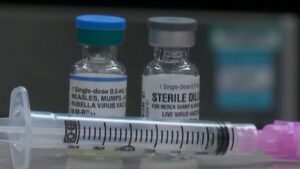
Amid the ongoing battle against COVID-19, a new symptom has emerged that is causing concern among those infected in China. Reports of a severe sore throat, ominously dubbed “razor blade throat,” have surfaced, prompting a wave of anxiety and curiosity across the globe.
According to Google trends data, there is a noticeable increase in searches from the U.S. for terms like “new COVID variant painful symptom” and “COVID razor throat.” This reflects a growing apprehension about this particular symptom.
Understanding the “Razor Blade Throat” Phenomenon
Despite the alarming nickname, experts urge the public not to panic. Dr. William Schaffner, a professor of preventive medicine at Vanderbilt University Medical Center, emphasizes that such symptoms are not new. “In the past, as new variants have come on the scene, there almost invariably have been questions about distinctive symptoms,” Schaffner explains. “After a while, when you gather a lot of data, it turns out not to be the case — all of these symptoms have occurred before.”
This sentiment is echoed by Dr. Carrie Horn, chief medical officer at National Jewish Health in Colorado, who notes that a very sore throat has been associated with COVID infections for some time. “It’s a symptom that has been around, and it doesn’t indicate a new or more severe variant,” she states.
Expert Opinions on Current COVID Symptoms
Dr. Mark Burns, an infectious disease expert at UofL Health, points out that while a sore throat is indeed a symptom of COVID-19, it is not unique. “A sore throat is a symptom of this, but also fever and cough and fatigue, these are all symptoms as well,” Burns adds.
“To sum it all up, the symptoms, including sore throat, are really no different. There’s no increased intensity based on sore throat or anything like that,” — Dr. Mark Burns
While the term “razor blade throat” may sound intimidating, Dr. Schaffner reassures that the current COVID variants, particularly the Omicron variants, tend to be less severe than earlier strains.
Preventive Measures and Recommendations
COVID-19 tends to surge twice a year, once in winter and again in mid-to-late summer, according to Schaffner. The CDC’s Advisory Committee on Immunization Practices recommends that individuals at increased risk of severe COVID should receive two vaccinations annually. “One in the fall to prevent the winter increase, and another now to help prevent serious disease during the late summer and early fall,” Schaffner advises.
This recommendation is particularly pertinent for those aged 65 and older, individuals with underlying chronic conditions, and pregnant women. “The recommendation is to take special precautions and get that extra dose, because if we get infected, we get that extra protection and to help keep us out of the hospital,” Schaffner adds.
Additional Protective Strategies
In addition to vaccinations, wearing masks in indoor spaces, maintaining social distance, frequent hand washing, and improving ventilation are effective ways to protect oneself from COVID and other respiratory viruses, says Burns.
Treatment and Care for COVID Symptoms
For those experiencing COVID symptoms like sore throat, fatigue, cough, or fever, testing is crucial. If infected, it is important to consult with a healthcare provider, especially for high-risk individuals, as treatments are available. “It’s important that you talk to your primary care provider as the guidance will vary depending on your age, underlying conditions, and other risk factors,” Schaffner notes.
Dr. Horn advises that over-the-counter medications such as Ibuprofen and Tylenol can help alleviate symptoms. “There’s no reason to be miserable,” she says. “So, take the medicine that you are able to take to help.”
Staying hydrated is also essential, even if a sore throat makes it challenging. Drinking water and herbal teas can prevent dehydration, which can further irritate the throat, Horn explains.
Preventing the Spread of COVID
If you are sick, Horn stresses the importance of isolating to prevent transmission. “If you are sick, it’s best to keep your germs to yourself,” she advises. This includes canceling social plans and staying home from work if possible. If not, wearing a tight-fitting mask is key.
“Preventing transmission is the biggest thing that we can do to help keep everybody healthy,” — Dr. Carrie Horn
As the world continues to navigate the complexities of COVID-19, understanding symptoms and taking preventive measures remain crucial in mitigating the impact of the virus.







